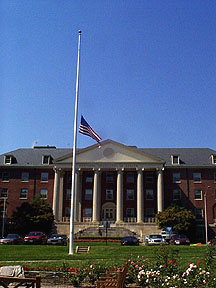
| T H E N I H C A T A L Y S T | S E P T E M B E R – O C T O B E R 2001 |
|
|
|
RESEARCH COMMUNITY AT HALF-MAST |
 |
As The NIH Catalyst went to press, the United States had just witnessed the worst peacetime attack in history—the September 11 terrorist attack on the towers of the World Trade Center and the Pentagon. NIHers quickly rose to do their part in recovery efforts.
With central coordination from the DHHS Office of Emergency Preparedness, the Public Health Service deployed 41 officers PHS-wide. NIH staff expected to assist with forensic pathology and to backfill at the Navy Medical Center, replacing staff deployed to New York aboard the Navy’s medical ship Comfort. Fifty nurses and 50 doctors added their names to the lists of volunteers prepared to help with victims from New York or the Pentagon.
HHS dispatched five disaster medical teams to New York and three in the Washington metropolitan area. Each team had approximately 35 physicians, nurses, and emergency medical technicians trained to handle traumatic injuries. In addition, four disaster mortuary operational response teams were sent to New York and three to the Washington area.
The NIH Blood Bank collected an astonishing 404 units of blood in 36 hours—about 60 percent of the blood was drawn from NIHers and others on campus. The bank quickly shipped off 70 units of blood it had in store to Fairfax INOVA hospital for victims expected from the Pentagon crash. Named a regional collection center, the NIH Blood Bank stayed open until 8:00 p.m. collecting, typing, and testing almost eight times the number of donations it usually handles in a day.
"If there’s anything we can do to help, we want to do it—we wish we could do more," was what donors told Susan Leitman of the Clinical Center’s Department of Transfusion Medicine. Leitman was amazed by the nonstop efforts of blood bank staff and the patience of donors, from whom she heard not a single complaint, despite waits of up to 2 to 3 hours. "It was extraordinary," Leitman says.
Harvey Klein, chief of the transfusion medicine department, urged people to call the Blood Bank to make appointments to donate blood in upcoming weeks. "We are concerned that there will once again be a real shortage after the acute period has passed," Klein wrote in an NIH-wide message.
Security on the Bethesda
campus was intensified, with all but four or five entrances to the campus closed.
NIH police posted at the street entrances and some buildings checked for parking
permits, ID cards, and other evidence that people coming in had a good reason
to enter. It was not clear how long the intensified security would be in effect.
![]()